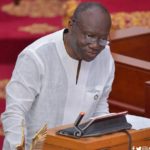Government has blamed Ghana’s poor showing in the latest World Press Freedom Index on the change of methodology by the reporters without borders.
“Due to this development, four (4) of the countries (Netherlands, Jamaica, Switzerland, and New Zealand) that ranked top ten (10) in 2021 significantly dropped in ranking, slumping out of the top ten (10) in the year under review,” Information Minister Kojo Oppong Nkrumah said in a statement.
The statement added: “It is worthy of note that Ghana’s dip in ranking was largely influenced by two of the new parameters, namely, the Economic Context and Safety of Journalists where the country scored 47.22% and 62.25% respectively.”
Government also said the report throws light on a new concerning development in the media landscape.
“It is also striking that the new report took into consideration the effect of opinion media, propaganda, disinformation, and fake news and their adverse impact on press freedom ranking for affected countries. This is a result of growing political and social tensions leading to information distortions and the publication of false news, particularly across social media platforms”.
Ghana has dropped 30 places from 2021 to rank 60th on World Press Freedom Index 2022 with a score of 67.43.
Ghana has also dropped significantly on the continental ranking for the safety of journalists.
African countries ahead of Ghana include Namibia, South Africa, Cabo Verde, Côte d’Ivoire, Burkina Faso, Sierra Leone, Gambia and Niger.
“Although the country is considered a regional leader in democratic stability, journalists have experienced growing pressures in recent years. To protect their jobs and their security, they increasingly resort to self-censorship, as the government shows itself intolerant of criticism,” the World Press Freedom indicated in its latest ranking released May 3,2022.
It added: “The 2019 information access law authorises journalists to demand information of national interest. However, a clause in the law allows a fee to be charged if the information requested is in a language other than English – a provision used to deny journalists’ access to the information they seek”.
The report further said: “In addition, one third of media outlets are owned by politicians or by people tied to the top political parties. The content they produce is largely partisan. In Ghana, most media outlets face financial problems, reflected in low salaries and poor working conditions for journalists. Frequently, new newspapers are launched only to fold in a few months, due to inability to meet production costs.
“State-owned media, for their part, benefit from government advertising contracts and payment for publishing news items. Government advertising is awarded through a non-transparent and inequitable process”.
Index 2022 – EN – CONFIDENTIAL (2) (3)
Source: Ghana/Starrfm.com.gh/103.5FM




